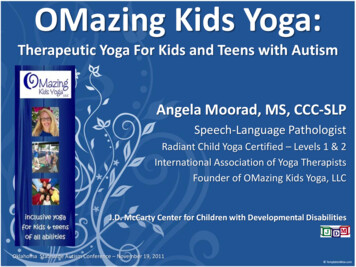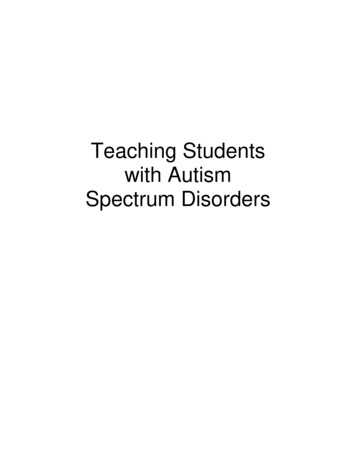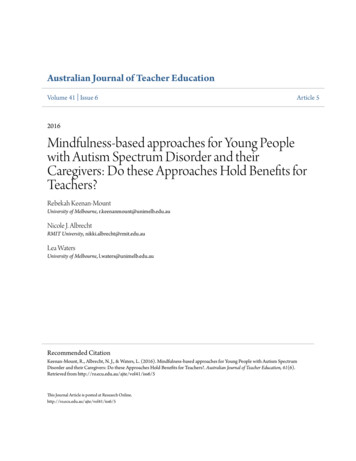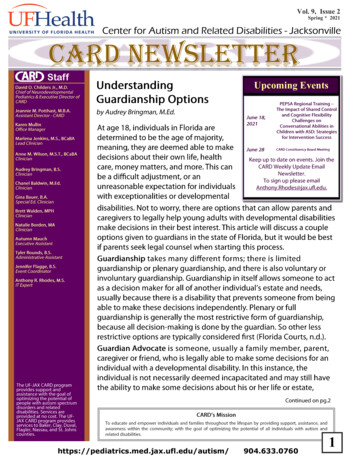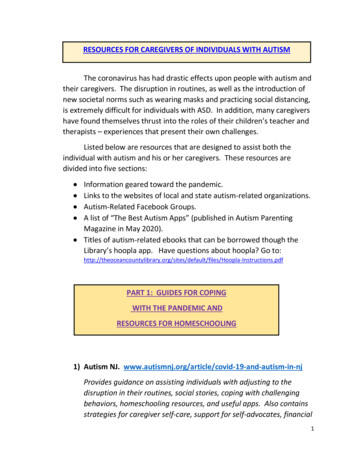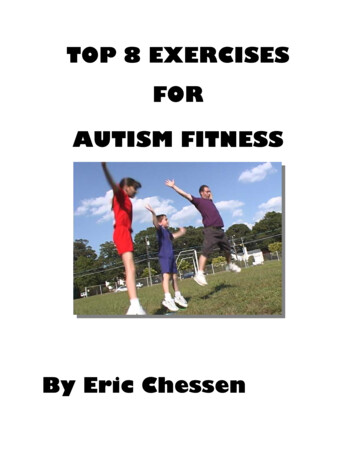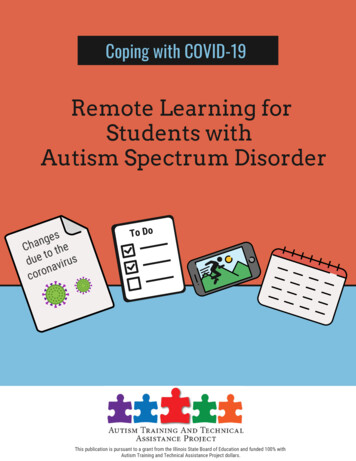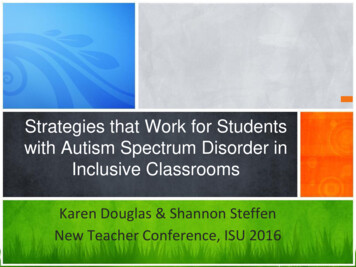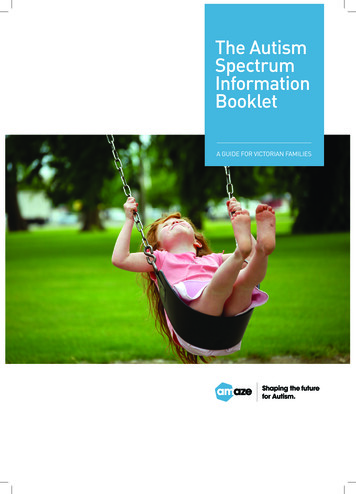
Transcription
The AutismSpectrumInformationBookletA GUIDE FOR VICTORIAN FAMILIES
ContentsWhat is Autism?2How is Autism Diagnosed?4Acronyms and Glossary6Common Questions and Answers7What does Amaze do?11Funding and Service Options12Helpful Websites14National Disability Insurance Scheme16Suggested Reading18This booklet has been compiled by Amaze toprovide basic information about autism from anumber of perspectives.It is a starting point for people with a recentdiagnosis, parents/carers of a newly diagnosedchild or adult, agencies, professionals and studentslearning about the autism spectrum for the firsttime.Once you have read this information package,contact Amaze if you have any other questions oryou require more information.1
What is Autism?Autism is a neurodevelopmental condition that causes substantial impairments in social interaction andcommunication and is characterised by restrictive and repetitive behaviours and interests.People on the autism spectrum may be affected in the following ways:Social InteractionMay display indifferenceIN CHILDRENIN CHILDRENDoes not play with other childrenJoins in only if adult assists & insistsPeople on the autism spectrum may not appear to be interested in joining in with others, or they may wantto join in but not know how. Their attempts to respond to social contact may appear repetitive or odd.Alternatively, they may be ‘too social’, such as showing affection to strangers.In general, people on the autism spectrum often have poor social skills and difficulty understandingunwritten social rules. They often lack understanding of acceptable social behaviour.Social CommunicationIndicates needs by usinganother person’s handsEcholalia - repeats words backi.e. ‘echoes’ wordsTalks continually about one topicMany people on the autism spectrum have difficulties with verbal and non-verbal communication: somemay not speak at all, some have limited speech, some have echolalia (where they repeat what others say).Others may have a large vocabulary, but struggle with the social use of language. They might have difficultyunderstanding jokes or satire, may take things literally, or have difficulty taking turns in conversation.People on the autism spectrum may also have difficulties with non-verbal communication and using andunderstanding body language, gesture, facial expression and tone of voice to communicate.Some people have difficulty understanding the feelings of others or that others have different feelings andthoughts to their own. This is known as ‘Theory of Mind’.2
Behaviour, Interests and ActivitiesFAMILIARROUTERepetitive activities, interests& behavioursDIFFERENTROUTEPreference for routineSolitary or independent activitiesor pursuitsPeople on the autism spectrum may be preoccupied with detail and may enjoy lining up or colour-codingitems such as blocks and toys.They will often prefer a predictable environment with expected events and routines. Changes in routinescan be very difficult for people on the autism spectrum and can cause high levels of anxiety.A person on the autism spectrum may make repetitive movements such as rocking, twirling, flickingand arm flapping. This is called “stimming” and it can help them to express their feelings, to soothethemselves, and regulate sensory experiences.Sensory ProcessingComforting repetitiveself-stimulationSeeking sensory inputSensory environment may beoverwhelmingPeople on the autism spectrum often have marked differences in their sensory processing and can beover-responsive, under-responsive or have difficulty in processing sensory information.Those who are over-responsive may find sound, light, smell, touch and taste overwhelming: they aresensory avoiders.Those who are under-responsive may seek sensory stimulation from their environment: they are sensoryseekers.Every person on the autism spectrum is differentThe one thing that people on the autism spectrum have in common is that every single one is unique.3
How is AutismDiagnosed?If you are concerned that you, your child, or otherfamily member, may have autism often the first stepis to speak to your General Practitioner (GP). GPsdo not make the diagnosis themselves, but theycan refer you to specialists who will carry out anassessment and make the diagnosis.Specialists that may be involved in the diagnosis:Paediatricians/PsychiatristsA specialist doctor may be involved in theassessment. For adults, this will usually be apsychiatrist. For children up to the age of 18 thismay be a paediatrician or a child and adolescentpsychiatrist.There are other conditions that have symptomsin common with autism so it is important to havean accurate diagnosis. Some of these conditionsmay be treatable. There are also some medicalconditions that can occur at the same time asautism and it is important to diagnose and treatthese as well.Paediatricians and psychiatrists will ask detailedquestions about the history of the person and thefamily. This information can give important clues tothe diagnosis and possible causes. Paediatriciansor psychiatrists may order blood tests, includinggenetic or chromosomal tests. There are currentlyno genetic tests for autism, but it can occur alongwith genetic or chromosomal conditions, such asFragile X Syndrome. Doctors may also order bloodtests for levels of nutrients such as iron. Low levelsof these nutrients do not cause autism, but peopleon the autism spectrum can be fussy eaters andmay be missing out on some nutrients. If this is thecase, the doctor may recommend supplementsto make up for anything that is missing from theperson’s diet. These supplements will not treatautism, but they may help with the person’s generalhealth and well-being.Sometimes paediatricians will conduct tests thatgive an estimate of children’s developmentallevels. They will look at whether children have metdevelopmental ‘milestones’, such as crawling,walking or talking at the same age most childrenstart to do these things. Psychologists (see below)will conduct more detailed developmental tests.4PsychologistsPsychologists will often conduct tests that assessa person’s developmental or cognitive abilities.These tests are important to determine someone’sstrengths and difficulties, as well as how theycompare to other people their age. These testsmay give a summary score, often known as anIQ, and a number of subtest or scale scores. Thisinformation is important in making the diagnosis.People on the autism spectrum often have anuneven pattern of abilities: for example they maybe relatively good at visual problem-solving, suchas jigsaw puzzles, but relatively poor at socialunderstanding and communication.This information is also important for planning thebest way to help the person. For example, theymay learn better if they are given visual information,such as pictures or visual timetables, than theywould if they were given verbal instructions orexplanations.It is not always possible to get a reliable scorefor people on the autism spectrum, especiallyyoung children, often due to difficulties in gettingthem to pay attention and understand andfollow instructions. However, psychologists withexperience in autism will use their observations ofthe person’s behaviour – not just the test scores –to help make the diagnosis and to judge whetherthe score is likely to be reliable. In some casessomeone’s pattern of abilities may be so uneventhat the IQ score is not a good summary of theirabilities, so it is more important to look at thesubtest and scale scores. Some people on theautism spectrum also have an Intellectual Disability(ID). If it is possible to get a reliable IQ score it canhelp make this diagnosis.In addition to the observations psychologistsmake during the cognitive tests, they may alsouse standardised observation assessments, suchas the Autism Diagnostic Observation Schedule(ADOS).They may observe people at home, school orwork. If this is not possible, psychologists willinterview the parents, carers or teachers aboutthe behaviour of people they are assessing.They may use a combination of standardisedinterviews or checklists and informal questioning. Ifpsychologists are assessing adults or adolescents,they will interview the person as well.
Speech PathologistsSpeech pathologists assess the communicationskills of people who may be on the autismspectrum. They are usually involved in theassessment of young children and more rarelyinvolved in the assessment of adolescents oradults. Communication does not just involvespeech, but also non-verbal aspects ofcommunication, such as gestures, body languageand facial expressions. Speech assessments mayinvolve standardised tests of the person’s receptiveand expressive language. These tests assess howwell the person understands language and howthey express their needs, wants, thoughts andfeelings, compared to other people the same age.Another important aspect of communication thatspeech pathologists assess is ‘pragmatics’, or thesocial use of language, including conversation skillsand the non-verbal aspects of communication.Some people on the autism spectrum know a lotof words and talk a lot about their own interests,but may not be able to take turns and carry ona conversation. Speech pathologists may useinformal interactions and observations of theindividuals, and interviews with their parents, carersor teachers, to gain more information about theireveryday communication skills.As with the psychologists’ tests, it is not alwayspossible to get a reliable score from formal tests,especially with young children who may not be ableto sit still and follow instructions.In these cases, information from the parents orcarers is especially important. Speech pathologistsoften interview parents or carers to get backgroundinformation, such as when the person startedtalking.Occupational TherapistsOccupational therapists (OTs) are not alwaysinvolved in the assessment of people who maybe on the autism spectrum, but they may provideinput. OTs assess motor skills, everyday living skills,and sensory processing.Motor skills include fine-motor skills, such as usingpens or pencils and scissors, and gross-motorskills, such as balance, walking, running andcoordination. Everyday living skills include self-care,such as dressing and washing.People on the autism spectrum may be oversensitive or under-sensitive to this information, orhave a combination of both over-sensitivity andunder-sensitivity. For example, they may scream orblock their ears when they hear everyday sounds,but not appear to notice when someone calls theirname. They may become very distressed by a lighttouch, but not react to a heavy fall that would beexpected to cause pain.OTHER PROFESSIONALSNeurologistsNeurologists are generally not involved in an autismdiagnosis, but paediatricians or psychiatrists mayrefer individuals for assessments by neurologiststo test for other conditions or underlying causesthat may be associated with autism. Neurologistsconduct tests of brain activity, such as electroencephalograms (EEGs), or brain imaging, suchas magnetic resonance imaging (MRIs). EEGscan be used to diagnose epilepsy which is morecommon in people with autism than in the generalpopulation. EEGs can also detect more subtledifferences in brain activity, so if a doctor refersan individual for an EEG, it does not necessarilymean that the doctor thinks that the individual hasepilepsy. MRIs give a ‘picture’ of the brain.Autism is thought to be caused by differencesin the brains of affected individuals, but thetechnology that is available currently may not showthe subtle differences that result in autism.AudiologistsAudiologists test hearing. They are not usuallyinvolved in diagnosing autism, but paediatricians,psychiatrists or GPs will often refer individuals,especially young children, for hearing tests to makesure their communication difficulties are not causedby hearing impairments. Some children on theautism spectrum may appear to be deaf becausethey do not respond when people call their name.Some people on the autism spectrum also have ahearing impairment. If they do, then hearing aids,cochlear implants, or sign language may help withtheir communication. However, due to their autismthey will still have difficulties with communicationbeyond what people with hearing impairmentsusually have.Sensory processing is the way that a personprocess information from their senses: sight, smell,touch, hearing, taste and awareness of their ownbodies.5
Acronyms and GlossaryAsperger’s DisorderIQA type of autism described in an earlier edition ofthe DSM. Now captured under the diagnosis ofAutism Spectrum Disorder in the current DSM-5.Intelligence Quotient - a score derived from oneof several different tests designed to assessintelligence. An average IQ is 100, and a scorebetween 90 - 110 is considered to be in theaverage range.Autistic DisorderA type of autism described in an earlier edition ofthe DSM. Now captured under the diagnosis ofAutism Spectrum Disorder in the current DSM-5.Relating to the development of the brain.Autism Spectrum Disorder (ASD)Neurotypical (NT)A condition affecting social communication, socialinteraction, behaviour and interests; previouslyclassified under separate categories of AutisticDisorder, Asperger’s Syndrome, PervasiveDevelopment Disorder - Not Otherwise Specified(PDD-NOS) and now combined under the onename.A term which describes people who meetneurological and cognitive milestones and aretherefore typically developing.DSM-5The Diagnostic and Statistical Manual of MentalDisorders, 5th edition, released May 2013 by theAmerican Psychiatric Association to replace thefourth edition (DSM-IV).Fragile X SyndromeAn inherited disorder caused by a defective geneon the X-chromosome causing intellectual disabilityand facial abnormalities in males, and with mild orno effects in females. Between half and a third ofpeople with Fragile X also have autism. For mostpeople on the autism spectrum, the cause oftheir autism is unknown; for people with Fragile XSyndrome, the cause of their autism is most likelythe Fragile X gene mutation.NDISThe National Disability Insurance Scheme, beingimplemented by the National Disability InsuranceAgency (NDIA). A trial site is currently operating inthe Barwon region of Victoria.Pervasive Developmental DisorderNot Otherwise specified (PDD-NOS): A type ofpervasive developmental disorder that does notmeet diagnostic criteria for Asperger’s Syndromeor Autistic Disorder under DSM-IV, and nowremoved in DSM-5. Some people with PDDNOS may meet the criteria for ASD or SocialCommunication Disorder under DSM-5.Social Communication Disorder (SCD)A new diagnosis in DSM-5 for those peoplewith deficits in communication and socialcommunication skills but not satisfying criteria forASD.Global Developmental Delay (GDD)Social ReciprocityA diagnosis given to a child under 5 who failsto meet a number of developmental milestones.Diagnosis of GDD may be given when thereare physical barriers to assessment, the child isvery young or when clinical severity cannot beassessed.Playing an equal role in a social exchange; bothinitiating and responding to another, e.g. takingturns in a conversation.IDA person is said to have an intellecual disability(ID) if they have an IQ (intelligence quotient) below70 and significant difficulty with daily living skills,including looking after themselves, communicatingand taking part in activities with others.6NeurodevelopmentalSocial SkillsThe ability to interpret and respond to social cuesand fit in to social environments.Theory of MindThe ability to understand that other people havebeliefs, desires and intentions that are differentfrom one’s own. Our theory about what thecontent of other people’s minds might be.
Common Questions& AnswersIs there a cure for autism?There is no cure for autism and it is not considered to be reversible. It isa lifelong condition.Individualised therapy and effective supports will help to overcome thedifficulties presented by autism, manage characteristics and help ensurethat people on the autism spectrum lead a happy and fulfilling life.What causes autism?The cause is not clear. Autism can run in families, which suggestsgenes play an important role in its cause. Multiple genes seem tobe involved. However, specific genes for autism have not beenconclusively identified and currently there is no medical or geneticscreening or diagnostic laboratory test for it. Diagnosis is based soleyon the presence of particular behavioural patterns.Is autism caused bysomething parents did ordidn’t do?No. Autism is not caused by a particular parenting style or by theactions of parents. While we don’t know exactly what does causeautism, we know that these theories and others like ‘cold parenting’are completely false.How common is autism?Autism is being diagnosed in around 1 in 100 school-age children inAustralia. More males than females are diagnosed with autism.Does autism co-exist withother conditions?Autism can occur by itself or in association with other disorders suchas intellectual disability, anxiety disorders, ADHD, learning disability,epilepsy, Tuberous Sclerosis, mood disorders, sleep disorders, eatingdisorders, and others.Will my child always bethe same?Many parents whose child has just been diagnosed with autism worrythat this means that their child will not progress. Although autism isa life-long condition, children with a diagnosis will grow, learn, anddevelop as they get older. Their characteristics and behaviours willchange throughout their life. Life circumstances and life stages, aswell as therapy and support, can make a big difference. With the righttherapy and ongoing support, people on the autism spectrum canlearn to work to their strengths, get around their difficulties, and usetheir interests and abilities productively.Can children on theautism spectrum go to amainstream school?Yes, all children on the autism spectrum are legally entitled to go to amainstream school. Some may qualify for some extra funding, whichthe school can use to help the children, for example, by employingan integration aide or acquiring help from a psychologist, speechpathologist or other professional.Some may qualify to go to an autism-specific school in their region.Those who also have an intellectual disability may qualify for a SpecialSchool or Special Developmental School.7
If you are a parent, choosing a school for your child is a very personaldecision. You may seek advice from other people, but ultimately youwill need to decide what is best for your child.Can medication be usefulwith people on the autismspectrum?Medication has no specific role in treating autism itself.However, some people on the spectrum exhibit severe behaviourpatterns, experience high levels of anxiety or depression, havedifficulty sleeping, or may develop epilepsy. In such cases, medicationmay have a role in the treatment of these specific conditions andshould be prescribed by a practitioner familiar with autism.Is autism cause byvaccinations given tochildren when they are18-24 months old?No. There has been a debate over the role of vaccines in causingautism, particularly around the Measles/Mumps/Rubella (MMR)vaccine. There are many people on both sides of this debate, andnumerous internet blogs, groups and forums supporting either side.Scientific research has been unable to find any link between receivingthe MMR vaccine and consequently developing autism.The research study that originally suggested a link between the twohas since been retracted by the journal that published the study asthe researcher’s methods were found to be flawed.Large studies have indicated the same rates of autism amongstvaccinated and non-vaccinated populations indicating no connectionbetween vaccination and autism.Do all people on theautism spectrum alsohave an intellectualdisability?No. An Intellectual Disability (ID) is diagnosed when a person scoreswell below the average in several areas of cognitive ability andadaptive behaviour. People with an ID show impairments acrossa number of areas, including their verbal skills, non-verbal skills,processing speed, working memory, and adaptive behaviour or lifeskills. Some people on the autism spectrum have a co-occuringID (thought to be around 50%), but many are of average or aboveaverage intelligence.People on the autism spectrum often display an uneven pattern ofabilities. They may score below average in some areas of cognitiveability, such as verbal skills or adaptive behaviour skills, but scorein the average range or above average in others, for example rotememory or non-verbal skills.Are people on the autismspectrum always gifted?Sometimes. Portrayals of the autism in movies make it seem as if allpeople on the spectrum have extraordinary, almost magical, skills!In reality, some people on the autism spectrum are gifted in aparticular area, such as music, maths or drawing. When this talentco-occurs with a low IQ, it is called “savantism”. Some people on theautism spectrum have exceptionally high IQs and fit the criteria forbeing “gifted” as well as meeting criteria for autism.People on the autism spectrum tend to have an uneven profile ofabilities with peaks and troughs, unlike neurotypical people whotend to have an even profile of ability. This is important to rememberwhen thinking about giftedness, as even someone with extraordinaryabilities may still experience enormous challenges because of theirautism.8
Many people on the autism spectrum have abilities such asan excellent memory, keen observation skills, an aptitude fornumbers, and a depth of knowledge around subjects in whichthey are interested. However, they may also find other things, likecommunicating their feelings, understanding body language, or takingturns in a conversation, very difficult.It is important to work to the strengths of each person and, as withneurotypical people, encourage them to focus on the areas they enjoy.Can people on the autismspectrum be taught tocommunicate?People on the autism spectrum vary in their communication skills.Some may never develop language. Others might acquire somefunctional language, whilst others will develop meaningful, fluent, andeffective language.Communication skills can be taught using alternative methods: low-tech options include signing, symbols, printed word, photos,picture exchange systems or any combination of these; high-tech supports include voice-generating systems andcomputer-based products.For many people, these supports will aid the development oflanguage. As the autism spectrum is very broad, there are somepeople who may not develop speech, but will develop the ability tocommunicate through these alternative communication methods.Is it true that people onthe autism spectrumdon’t want to makefriends and don’t likeinteracting with others?Sometimes people on the autism spectrum may have a strongdesire to interact with people and have meaningful relationships, butmay be unsure how to approach others or develop an appropriatefriendship. Unlike neurotypical people, they may not intuitively learnthe social skills required for interacting with others. They may benefitfrom explicit instruction to help them develop an understanding ofappropriate social interaction and different kinds of relationships.Do people on the autismspectrum lack empathy?No. People on the autism spectrum can have empathy. Someoneon the autism spectrum may struggle to understand other people’sthoughts, feelings, and intentions. That can make empathy difficultbecause they won’t “get the message” about what the other personis feeling. For example, if someone’s mouth corners are turned down,their shoulders slumped, their eyes watery, a person with autismmay notice all of these things, but not understand that they mean“someone is sad”.Some people on the autism spectrum will interpret these signs andwill feel empathy, but their autism may make it difficult for them toexpress it.If you think about it, the rules around what we call “empathy” are verycomplicated. You need to identify the emotion correctly (from verysubtle gestures and expressions), then figure out what to do. Whatyou decide to do depends a great deal on the context (for example,how you react to your friend being upset is very different from how tohandle your boss feeling the same way).Because people on the autism spectrum struggle with the kinds of“social intuition” neurotypical people use, they may need to be taught9
explicitly what a facial expression means or what to do when they seea person feeling a certain way.To make things easier for someone on the spectrum, it can be helpfulif you tell them what you are feeling and what you would like them todo about it.I am an adult and I thinkI might be on the autismspectrum - should I get adiagnosis?With more awareness and understanding in the community aroundthe autism spectrum, adults may also wonder whether they havethe condition. For many, the diagnosis of their child prompts themto reflect on their own lives and seek further information about adiagnosis for themselves.Some may struggle with secondary issues such as depression,anxiety and social isolation. In these cases, a diagnosis may bebeneficial to have an understanding of the best way to approachtherapy and further support, as well as understanding themselves.Additionally, a diagnosis may also provide someone with access toother services, resources, employment support and financial supportwithin the community. It may be expensive for adults to obtain adiagnosis and if they are well supported and happy, a diagnosis maynot be necessary.10How can I help someoneon the autism spectrum?We can all help people on the autism spectrum. It begins withpatience, knowledge and understanding about autism. Animportant fact to remember is that every person on the spectrum isunique. People on the autism spectrum will have unique strengthsand challenges. To help a person on the autism spectrum, it isfundamental to identify the person’s likes and dislikes as well as theirkey motivators. Simplifying communication and instructions mayalso help. Other ways to help include taking the time to listen andcommunicate with the person, minimising stressful scenarios, andreading books on the subject to obtain a better understanding.What does the future looklike for a person on theautism spectrum?Many people on the autism spectrum will require support throughouttheir lives. (And many will not.)With or without a structured support programs, people on the autismspectrum can live wonderful, meaningful, and fulfilling lives.
What does Amaze do?Amaze is the peak body for people on the autismspectrum and their supporters in Victoria. Amazeraises awareness and influences positive changefor people on the autism spectrum and theirfamilies/supporters and provides independent,credible information and resources to individuals,families, professionals, government and the widercommunity.Early Days WorkshopsThe Early Days program is a series of freeworkshops for families with children on the autismspectrum (or those undergoing diagnosis) aged0-6. They are for parents, grandparents, and familymembers. Topics include: My Child and Autism (Introductory Workshop)Understanding BehaviourTips for Everyday SkillsProgression to SchoolEarly Days also offers a workshop tailored tothe needs of non-custodial parents, as well aswebinars you can participate in from your homecomputer.www.amaze.org.au/earlydaysHelping Children with AutismOur Autism Advisor Service provides information,support and registration for the Helping ChildrenWith Autism (HCWA) funding package. Thepackage is available to Victorian parents withchildren newly diagnosed with autism.The HCWA package is an initiative providingsupport for children aged 0 – 6 years with AutismSpectrum Disorder (ASD), their families and carers.The package covers a range of initiatives andservices, including funding for therapies.Capacity BuildingAmaze Knowledge is providing training coursesand tailored professional development toorganisations and interested individuals.Amaze WebsiteThe Amaze website has information on autismacross the lifespan. It has information aboutdiagnosis, professional supports, and aboutAmaze. It also includes information about the latestnews and events in the Victorian community.There are also a number of information sheets onimportant topics such as transition to school andeducational options, strategies to manage day-today challenges like sleep, behaviours, friendshipsand relationships.www.amaze.org.au/resourcesAmaze InfoLineThe InfoLine is an information and referral servicefor people on the autism spectrum, parents,families and the general public. Our AutismInformation Advisors are available to answer yourquestions about autism and to help you find outwho to go to for further assistance.The Autism Information Team is made up of peoplewith a broad range of experience and their role isto give you information and point you in the rightdirection for further assistance. Advisors are oftenon the phone answering queries: if you don’t get ananswer straight away, please leave a message andan Autism Information Advisor will return your call.info@amaze.org.au - 1300 308 699*Please note that we do not provide a CrisisService or Help Line.If you need urgent assistance, call:Lifeline 13 11 14Suicideline 1300 651 251Parentline 13 22 89Amaze MembershipMembership of Amaze provides a range of benefits:by joining, you are showing your support for theorganisation, joining our autism community, andproviding strength in numbers to enable us to lobbyat government level for improved supports andservices for the entire autism community.In addition, there are a number of additionalbenefits as a member of Amaze. These changefrom time to time, but at time of publication include: Member discount on attending conferencesand events run by AmazeThe Spectrum magazineRegular member offersMember discounts on productsVoting righ
Some children on the autism spectrum may appear to be deaf because they do not respond when people call their name. Some people on the autism spectrum also have a hearing impairment. If they do, then hearing aids, cochlear implants, or sign language may help with their com
